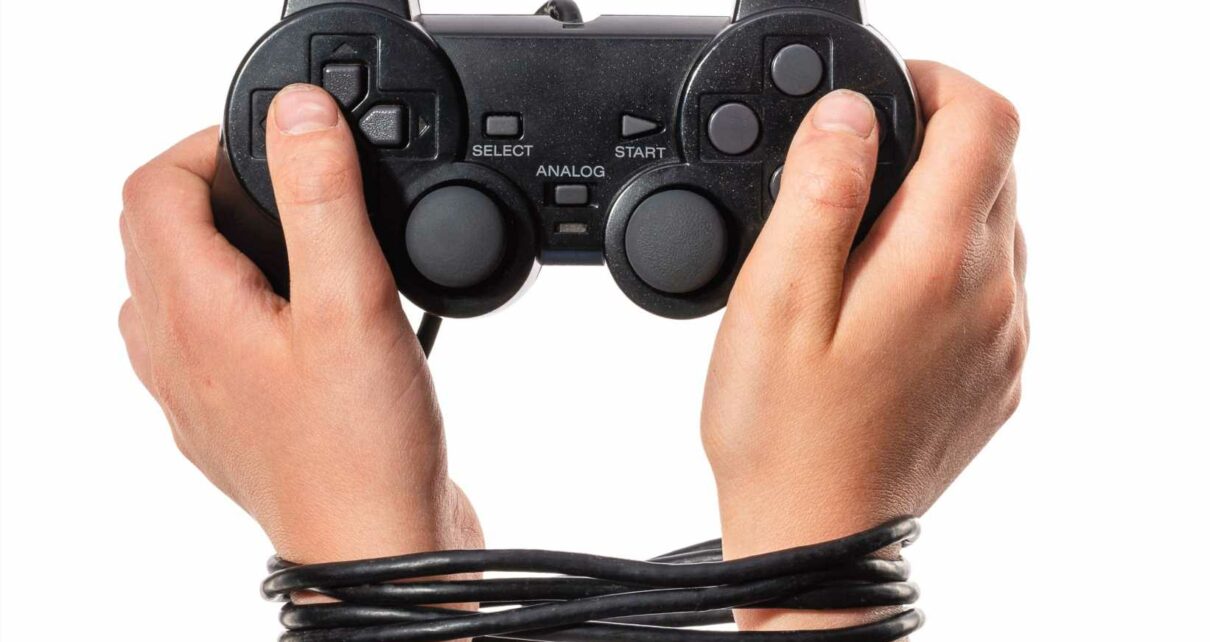AS the first NHS centre for gaming disorders is swamped with child patients, two mums reveal how their sons’ console addictions turned family life upside down.
The clock had just struck 1am when Olivia Baker* heard her eight-year-old son screaming in his bed.


When she went to settle him, he lashed out, hitting her in the face while calling out the names of baddies in his favourite video game.
Charlie* had always been a perfectly behaved child, but just seven weeks after being given an Xbox for his eighth birthday, he began struggling to sleep.
“Lots of Charlie’s friends already had computer games and he was desperate for an Xbox,” recalls mum-of-three Olivia, from Bideford, Devon.
“We didn’t see any harm in it, but just a few weeks after getting it, he began struggling to fall asleep. We’d never had an issue with him going to bed, but now he was often still awake at 11pm.
Read More on Gaming

Game addiction quiz reveals if your Fortnite obsession is a dangerous ‘disorder’

Gamers DON’T have a disorder says UK game boss as she blasts ‘addiction’ claim
"I’d lie with him to get him to drift off, then a couple of hours later he’d be awake again, often screaming the house down.
“He started to appear withdrawn and, whereas he used to play with Lego, read and do puzzles, all that seemed to bore him after he got the Xbox. I tried to limit his time on it, but it was the only thing that seemed to make him happy.”
Wondering if there was something going on at school, Olivia spoke to Charlie’s teachers, who agreed he was struggling to concentrate, but were also at a loss as to why.
Olivia says: “It was only when I went in to settle him that night, about three months after he got his Xbox, and he shouted out the names of some characters in his game, that I realised the console might be to blame.
Most read in Fabulous

The moon and sun make this your moment to decide what is right for you

I married a man who didn’t speak my language, says Kelly Brook

I’m a conjoined twin but manage to have sex despite my brother being there

Womanizer launches the ‘Wave’ – a world-first sex toy-shower head hybrid
"He’d often play Minecraft, Sonic, Mario and sometimes Roblox, but stupidly, I’d let him have Fortnite, which was rated 12+. A lot of his friends played it so I thought it’d be OK, but I’d noticed he became very aggressive when playing.
“After that incident at night, I took away the more frightening games and tried to limit how much time Charlie played on it. But it caused a lot of anger and frustration. I felt like I was losing my little boy.”
Charlie’s sleep issues worsened and the disturbing nightmares continued.
He started sleepwalking and wetting the bed. By now deeply concerned, Olivia sought professional help.
Two months before Charlie turned nine, she took him to see her GP, but was told the waiting lists for specialist help were very long.
Desperate for support, she raided her savings and booked a private counsellor recommended by a friend, costing £45 a session – who diagnosed Charlie with a gaming addiction. “We were so shocked,” says Olivia.
“We hadn’t even realised it was a real disorder.”
Since opening its doors in 2019, the first NHS centre for gaming disorders has treated 745 patients – including 327 in the last year, and most of them are teenage boys.
The clinic is in Earl’s Court, London, but offers online treatment to families across the UK.
Psychiatrist and founder of the centre, professor Henrietta Bowden-Jones, says police are sometimes called to the homes of child gaming addicts.

“By the time they see us, parents have tried everything,” she says. “Their immediate response is to take all devices away, which leads to aggression and violence.
“Sometimes out of frustration, the child will then self-harm. I have seen a couple of children trying to strangle themselves with their own hands, saying they’d rather be dead than not game.
"Often children are not going to school or attending sporadically. They are not focusing, because they’re not sleeping, they’re gaming. These children are gaming 12-14 hours a day.”
Olivia – who has two older daughters, neither of whom are into gaming – has never called police, but admits Charlie’s meltdowns were escalating.
He would get upset if she asked him to turn off the console and he’d always ask for 10 more minutes, which would turn into half an hour, before she and Charlie’s dad Stephen* persuaded him to stop.
“I’d end up having to pull the plug and he’d be inconsolable. He never physically lashed out, but the tantrums were getting worse,” she says.
Since his diagnosis, Charlie has now had around 40 sessions of cognitive behavioural therapy (CBT).
“We have probably spent over £2,000 so far. It’s a lot of money, but we were lucky to have a bit stashed away for a big family holiday,” says Olivia.
Following the therapist’s advice, Olivia has imposed strict time limits on how long Charlie can play.
The therapist also recommended new hobbies, so they signed him up to a football club and Cubs, and are arranging more outdoor play dates with friends.
“He still has the console, but we restrict it to one hour per day. Over the last six months he’s been sleeping better and has picked up at school. We are hoping Charlie is on the road to recovery,” Olivia says.
Figures from the UK Safer Internet Centre show that 77% of 8-17 year olds play games online at least once a week.
Worryingly, an Ofcom report last year found that 31% of kids had played against strangers or people they had not met in real life.
Therapist Sally Baker, who specialises in working with families on issues including addictions, anxiety and trauma, believes the coronavirus pandemic increased gaming addiction in kids.
“During lockdown, a lot of children were stuck indoors while parents were frazzled by home-working and home-schooling,” she says.
“Video games became something to do when other options were limited, plus it allowed children to connect with their friends,” she says.
Single-mum Sasha Barns* says her 16-year-old son Ethan* definitely started gaming more during the pandemic. “It was such a hard time. I was trying to do my PA job from home at the same time as home-schooling two children on my own,” says Sasha, from London.
“Ethan was only 13 and was always really sporty and sociable. He played football and tennis and, when he was told he had to stay at home, he really missed his friends.
"I work full-time to support us, so when he finished his schoolwork, I let him game. It was the only way I could cope, as Ethan’s sister was just nine and needed help with her schooling.
"Some days he would finish his schoolwork by 3pm and then game for seven or eight hours. Often he wouldn’t want to come off and I’d have to pull the plug out. There were a lot of fights,” she remembers.
Things reached a head in spring 2021, when she asked Ethan to stop gaming and he threw a chair at his bedroom window. “He has always been a calm boy, so to see him lose his rag was frightening. He’s quite a big lad, but I knew I had to stand up to him,” she says.
“Things had got so bad, I took his Xbox and Nintendo Switch out of his bedroom. He was furious, shouting what a bad mother I was, but I knew he was developing problems because of the games. He’d stay up until 1am and wouldn’t go to sleep.
"He lost interest in everything else, and even when things started opening up again after lockdown, he didn’t want to go out. He wouldn’t even play football, which he’d previously loved.”
Sally says it’s common for children to lose interest in other activities as they develop a gaming addiction.
“First, they’ll stop reading. Other games and activities won’t hold their attention in the same way, because gaming is based on a rewards system: you collect rings or points and that releases feel-good hormone dopamine in the brain. That’s how addiction starts,” she says.
After seeking help from an online centre specialising in child gaming addiction, Sasha is being given advice on how to deal with Ethan, but he refuses to admit he has an issue.
“I’ve now given him his console back, but imposed very strict limits,” she says. “He’s allowed two hours a day and he can’t play in his room.
"He still gets angry and moans I’m stricter than other parents, but at least he’s not being physically aggressive.
“Fortunately, his sister doesn’t like gaming. I hope in the future we can get back to being a loving family, but Ethan resents me right now and, it’s sad to say, but sometimes I feel almost scared of him.”
Sally says the violence that kids are exposed to on some video games also influences their behaviour in real life.
“If they become aggressive, it’s because they are acting out what they’ve seen in these games,” she explains.
“It is a very binary world of goodies and baddies, and the parent who has to impose rules therefore becomes the bad cop and the target of aggression.”
She advises concerned parents to encourage their children to experience more real-life connections. “One of the best things you can do is reintroduce them to activities in the real world. What they really need is more interaction with peers in real life, not just online,” she says.
“Trust your intuition – you know your children.”
Read more on The Sun

I confronted Phillip Schofield over affair rumours – his reply p***ed me off

Vet shares warning for dog owners to keep them safe during the hot weather
Visit Sally’s website at Workingonthebody.com.
Addiction therapist Sally Baker’s tips to take back control
Set limits: Nothing in its own right is damaging, but you need to stop gaming becoming a monoculture.
If a child is going out every day, getting some vitamin D, fresh air and seeing friends, you can allow them an hour on a game.
It must just be closely monitored and kept to a minimum.
No bedrooms: Letting children keep consoles in their bedroom is a massive mistake.
It needs to be in a room you pass through, so you can see what they are doing.
Check the age rating: Many games have an age rating of 13+, yet 10 year olds play them.
There is a panel that makes a decision about suitability and parents have a responsibility to follow these guidelines and be more savvy about the games that cause harm.
Socialise: Make sure children are still doing things in real life: football, sport, after-school clubs – anything with their peers where you know they are safe.
Even better if it’s outside.
If they are not socialising, this is a huge red flag.
Recalibrate: Change the rules if you want to.
Kids will say: “You’ve always let me.…” but just say it’s time to try something different.
Don't just pull the plug: If you give them an hour or 30 minutes, go in five minutes before their time is up so they can finish the level.
Be strict but don’t pull the plug.
This can be hugely frustrating for the child and sometimes leads to aggression.
Ask for help: If you’re concerned, contact The National Centre for Gaming Disorders on 020 7381 7722 or email [email protected].
Visit Cnwl.nhs.uk for more information.
- *Names have been changed


Source: Read Full Article


